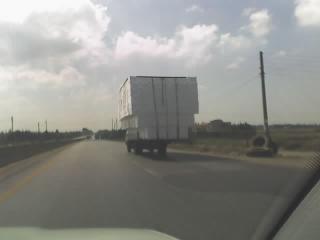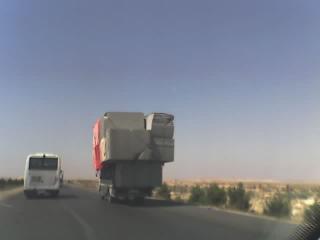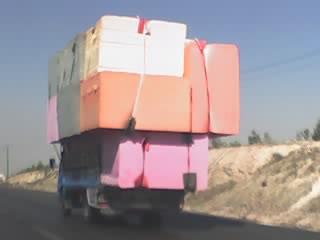Tuesday, September 27, 2005
View from Aleppo citadel (with curator)
Sunday, September 25, 2005
Site - yet another issue
On the road - just
Friday, September 23, 2005
The bigger picture
I read first the executive summary of a report by the UNDP and Prime Minister’s Office on Education and Human Development in
I later went with Deputy Dina (small in size but big in character) to hear from the authors about the chapter in the Plan on Childhood and Youth. After listening for some time while we were told how we should run the project, and in particular how we should involve sociologists with it, it transpired that the Chapter - er- didn't exist. The Plan is due out before the end of the year (it's late September now) and this chapter doesn't exist? 40% of Syria's population is 14 or under and this chapter doesn't exist?
The uplifting thing about this and other conversations is that I feel that our project - inspirational, fun, collaborative, clear about its purpose - can really stand out amongst all this. I feel too that once it's properly up and running it can act as a catalyst not just for children but for teachers, administrators and politicians as well. We have had great feedback from children and parent to the summer programme which has now ended (we have postponed the Aleppo stage, about which more later perhaps once I've calmed down), so we know there is demand for this sort of activity, and the children really respond to it. I'll post separately on the teenage debates we have run, which have centred on waste and the environment, but the teenagers themselves have raised issues of homelessness, the role and position of women, health, violence, pollution, water and smoking. It has been difficult sometimes to get the debates going - some parts of Syria seem more quiet than others - but we now have some fantastic insights into what young people care about and want to see change. Lots of them have said how good it is to have their views listened to, to have the chance to have a serious discussion. For the next phase we're going to capture this on video.
That aside, I feel that Syria's need for a substantial and rapid leap forward rather than a slow shuffle is going to be hard to achieve. The instinct to try and invent things from scratch here rather than looking for excellence elsewhere and adapting it, the lack of a management culture or context of competition that makes change a matter of daily survival, the risk-averse and insular administration, all work against the possibility real transformation. There are people here with vision, but whether they can carry the day I don't know.
Luvvies!
Before the Homs week, they threatened to pull out if their accommodation (Grand Hotel), transport (rented microbus at their disposal for the week) and food (SYP500 per person per three meals a day) demands were not met. At that point, Dina and Zuhair called their bluff and the group accepted the daily rate set by the project. At Homs and at Hama, however, there were numerous occasions on which members of the group did not appear, were late, or left in the middle of an activity and did not return. With the exception of one or two members, the group appeared unmotivated and unworried at dropping standards. As a result of the number of days on which the group was short-handed, it was decided to deduct $200 from the payment for the Homs week.
On 21 September the spokesman of the group visited the project office and met with Dina. He refused to accept the $200 deduction, and was adamant that the full rate should be paid. He complained about having to deal with children younger than 5 years old who often attended events. He complained that there were 40 children in one group at Hama. He would not undertake to provide seven or even six actors for Aleppo. [We know that two of the group are currently working on an assignment in Egypt, so will not be available.] He made a number of statements which we know to be untrue or ludicrous – for example he claimed that actors sometimes had to leave sessions because they were thirsty. Throughout the conversation he was rude and aggressive.
Sound though the original decision was to use this group, since Yarmouk they have proved a constant and time-wasting management headache. They have presented the project team with a constant stream of demands, to supplement their extremely generous fee. When we gave them an allowance for out-of-Damascus work they asked if we could organise accommodation and food for them instead. When we did that, they were dissatisfied with the hotel and restaurant provided. This has added to the complication of organising each venue. It is clear their interest in the project is entirely financial. They have made no effort to integrate with other members of the crew at venues, and feel that general assistance in the smooth running of a show is no part of their responsibility. They have complained about small spaces, heat, noise of parents talking, low numbers attending, high numbers attending. They behave as contractors rather than as part of the team. If only five actors are available for Aleppo it makes the programme unacceptably sub-standard from the start. Should any one of the five fall ill, the programme simply could not be performed. Taken together with the dismissive attitude, the poor level of professionalism shown at Homs and Hama, the constant complaints and lack of commitment, it does not seem worth incurring the cost and risk of the Aleppo week. It would be still less acceptable to pay the full rate to the group for less than full numbers, as they continue to expect.
I have therefore cancelled the Aleppo programme, and the theatre group has been so informed. This decision has not been taken lightly or without regret.We will reschedule a visit to Aleppo in the early part of the next programme.
Labels: Massar
Wednesday, September 21, 2005
Competition - of a kind
One of the more surprising things to come to light recently is that another relevant museum project has been on the boil (actually a very low heat at best) for some years: a new Science & Technology Museum, aimed at children. We met this week with its Steering Committee at the Ministry of Communications and Technology, who rather unnervingly started by hoping that we could provide them with advisory and financial support. The Committee is a large one. We were told that the Ministry of Technology and Communications has allocated $20m to this project, and were confident that more would come from Germany. A paper summarising the context and content of the museum was presented. This presents a comprehensive catch-all list of possible subject areas and objects for inclusion. It does not cover the outcomes, audience, interpretation, style or values of the institution. Is it populist or scholarly, for instance? Nor does it examine the implications of the proposed content – live animals, as one example, require specific conditions and care. Old steam railway engines require a lot of floor space, and once in place are difficult to move. There did not appear to be anyone with direct management responsibility for taking the project forward, nor any broad understanding amongst the Committee of the specialised process on which they were embarking. We agreed to meet again.
In a subsequent meeting with Dr Alfred Kraft of DTZ, the German development organisation, he explained his fear that the Technology Museum project might be losing direction, and that its expectations of financial support from Germany were double what was likely. He felt that the two projects were too close in concept to avoid competition for funding, and the possibility of bringing them into one project should be examined. The same comment had been made by the Steering Committee who felt that our project should be subsumed into theirs. Dr Kraft felt that any amalgamation should work the other way. I have resisted his suggestion that I manage two projects.
I said in both meetings that we must work together to articulate what is distinctive about each project, what areas might exist for overlap and collaboration, and the specific value each will contribute. If the Berlin Science Museum is committed to provide some form of pro-bono support (and from the conversations so far I suspect this may be more what people here hope than what Berlin has in fact promised) I recommend that they should rapidly take on a role in helping to form a local management team to do the necessary concept and content development for the Science & Technology Museum. Without this step, the project will struggle to go forward, let alone deliver anything of worth.
Thursday, September 15, 2005
Putting down markers
It is risky to state on the basis of little personal experience and much anecdote, but quality of local supply looks likely to be a major area of risk for the Project. Project management is little understood. Total Quality Management principles and attitudes appear non-existent. Method statements are unknown. ISO standards are rare. A cheery willingness to redo work until it is right is unacceptable for our purposes; the work has to be right first time. The major impact of this will be at the capital build stage of the Project, but to a lesser extent it will affect our work from the earliest stages. Schedule and cost control will be more exacting and consume more resource. Closer attention will need to be given to work in progress, and more elaborate contingencies will need to be developed against possible slippage or non-performance.
Labels: Massar
Wednesday, September 14, 2005
Furniture
Labels: Syria
Monday, September 12, 2005
Back again






Back from a holiday period with the family and catching up with progress. We (the project rather than the family) are in the middle of an activity programme - an early pilot and testing process - which is visiting cultural centres all over Syria. There was a media event at Homs while I was in London, organised at short notice, which seems to have gone very well. Lots of positive coverage in newspapers and magazines. First day at Hama (yesterday) was less successful with only 25 children in the morning and 45 in the evening. We are planning for around 100 each session. This morning nearly 200 turned up!
Subscribe to Posts [Atom]





